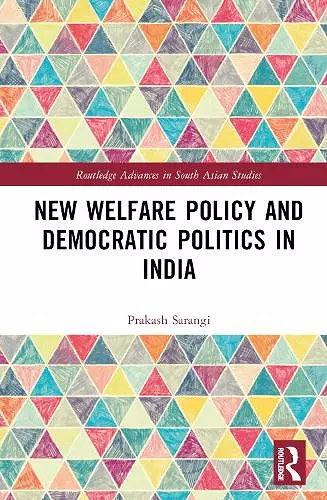New Welfare Policy and Democratic Politics in India
Format:Hardback
Publisher:Taylor & Francis Ltd
Published:11th Jun '24
£135.00
Supplier delay - available to order, but may take longer than usual.

New Welfare Policy and Democratic Politics in India offers an analysis of India’s welfare policy during the last couple of decades. It looks at how welfare policy making is viewed as a function of party competition and voter mobilization, showing a gradual transformation of political clients into entitled citizens through which democratic politics in India has redefined its contemporary welfare discourse.
The book argues that political parties formulate policies in order to respond to the voices of citizens and shows that a new welfare architecture emerged in India, characterized as responsive welfare. India has witnessed a sharp rise in such voices, which have been disadvantaged by a globalizing market. The size and vulnerability of this group has made them politically significant and electorally salient. These welfare aspirants have found a new political space through political parties to negotiate and assert their claims on the state, creating a milestone in India’s democratic politics trajectory, in the form of entitlement-based welfare policy. The book compares and evaluates the implications of these new welfare policies in the contexts of two governments: the Congress-led government during 2009-2014 and the BJP-led government during 20014-2019. The empirical data reveal remarkable similarities in their electoral pledges, policy outputs, policy outcomes and accountability towards citizens. These findings indicate significant convergence in their welfare policies, sans ideology or ethnic support base. It also reveals that the ideological differences among the two major parties do not prevent remarkable continuities in the formulation and implementation of welfare policies during their incumbencies, thus allowing for a bipartisan acceptance of a citizen-centric welfare policy.
Offering a new analysis to understand this citizen-party-policy linkage in the formulation of welfare policy in India, the book presents a macro analysis of India’s interface between democratic politics and welfare policy. It will be of interest to researchers in the fields of the politics of welfare, democratisation in changing societies, comparative politics and Indian and South Asian Studies and Asian Politics.
"A timely contribution to democratic theory and public policy, this work takes the discourse on welfare and welfare state into a new stage where the idea of 'responsive welfare' is presented as integral to democratic politics and economic development providing a tool to the citizens to assess competing electoral promises by parties."
-- Professor Manoranjan Mohanty, University of Delhi and Council for Social Development, India
“The conceptual link between democratic politics and welfare policies is the core argument of this book. Sarangi’s succinct analysis of India’s vibrant political process shows how party competition links citizenship to the entitlement to welfare. This elegant and closely argued book is a timely corrective to the chorus of ‘democracy backsliding’ in India.”
– Professor Subrata K Mitra, Heidelberg University, Heidelberg, Germany
ISBN: 9781032744605
Dimensions: unknown
Weight: 453g
182 pages